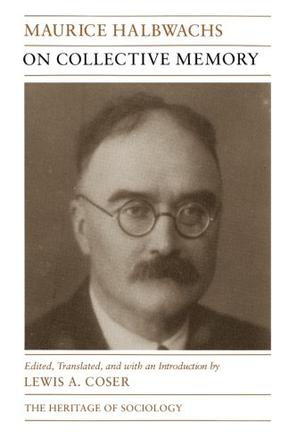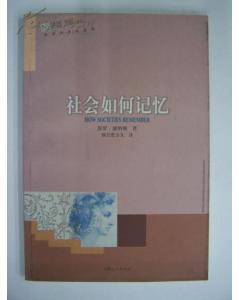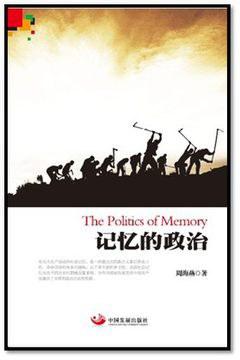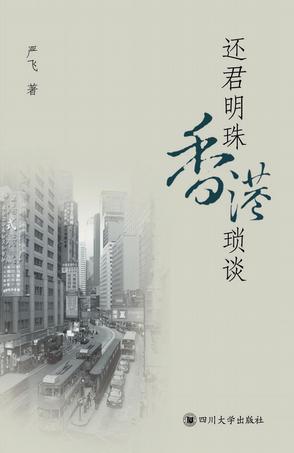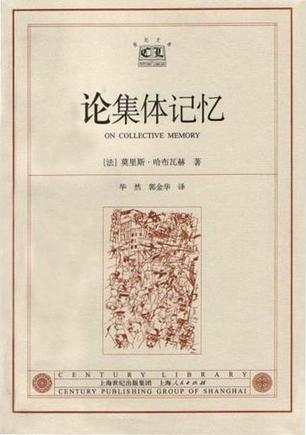欢迎来到相识电子书!
标签:集体记忆
-
On Collective Memory
How do we use our mental images of the present to reconstruct our past? Maurice Halbwachs (1877-1945) addressed this question for the first time in his work on collective memory, which established him as a major figure in the history of sociology. This volume, the first comprehensive English- language translation of Halbwach's writings on the social construction of memory, fills a major gap in the literature on the sociology of knowledge. Halbwachs' primary thesis is that human memory can only function within a collective context. Collective memory, Halbwachs asserts, is always selective; various groups of people have different collective memories, which in turn give rise to different modes of behavior. Halbwachs shows, for example, how pilgrims to the Holy Land over the centuries evoked very different images of the events of Jesus' life; how wealthy old families in France have a memory of the past that diverges sharply from that of the nouveaux riches; and how working class constructions of reality differ from those of their middle-class counterparts. With a detailed introduction by Lewis A. Coser, this translation will be an indispensable source for new research in historical sociology and cultural memory. Lewis A. Coser is Distinguished Professor of Sociology Emeritus at the State University of New York and Adjunct Professor of Sociology at Boston College. -
The Temple of Memories
This study focuses on the politics of memory in the village of Dachuan in northwest China, in which 85 percent of the villagers are sur named Kong and believe themselves to be descendants of Confucius. It recounts both how this proud community was subjected to intense suffering during the Maoist era, culminating in its forcible resettlement in December 1960 to make way for the construction of a major hydroelectric dam, and how the village eventually sought recovery through the commemoration of that suffering and the revival of a redefined religion. Before 1949, the Kongs had dominated their area because of their political influence, wealth, and, above all, their identification with Confucius, whose precepts underlay so much of the Chinese ethical and political tradition. After the Communists came to power in 1949, these people, as a literal embodiment of the Confucian heritage, became prime targets for Maoist political campaigns attacking the traditional order, from land reform to the “Criticize Confucius” movement. Many villagers were arrested, three were beheaded, and others died in labor camps. When the villagers were forced to hastily abandon their homes and the village temple, they had time to disinter only the bones of their closest family members; the tombs of earlier generations were destroyed by construction workers for the dam. --------------------------------------------------------------------------------------------- Review "One of the best local ethnographies to date on post-reform China. . . . Conceptually sophisticated yet undiminished by unnecessary jargon, the book provides one of the most readable and intelligently framed accounts of change and continuity at the local level in China." —Journal of Asian Studies "Anthropologists and historians will find themselves rewarded by this nuanced examination of social memory, ritual life, and the traumatic recent history of a remarkable village."—China Review International "This gem of a book takes the study of Chinese village culture to new levels of theoretical sophistication, ethnographic nuance and literary evocativeness. . . . There are many fine books that tell similar stories of the devastation of rural communities during the Maoist era. Dachuan is different only in that the depth of its tragedy was several degrees worse than most. But what makes Jun Jing's book unique is his discovery of a way to probe the meaning of such a history for the villagers."—China Quarterly "All audiences can enjoy the universal subjects of the book—children and food. . . . Feeding China's Little Emperor's is useful both for anthropologists or those looking at social change over the last few decades."—The China Business Review "In 1961 the entire village of Dachuan was destroyed when it was submerged under a reservoir created by a newly constructed hydroelectric dam. . . . In Jun Jing's beautifully written account, The Temple of Memories, he reveals how the villagers tra -
社会如何记忆
我们一般认为记忆属于个体官能,不过,有些思想家一致认为,存在着这样一种东西,它叫做集体记亿或者社会记忆,于是,本书涉及的问题是:群体的记亿如何传播和保持? 作者在短短十多万字的篇幅中,为读者论证了有关过去的形象和有关过去的回亿性知识,是在 (或多或少是仪式的) 操演中传送和保持的。作者见解独到地关注于这类社会记忆中的体化实践而非刻写实践,这对研究社会、政治和人类学的学者来说,不无理论启迪。 -
记忆的政治
该书是南京大学周海燕副教授历经七年、通过多次多地实地研究和扎实文献研究完成的博士论文。 Elizabeth J. Perry(哈佛大学政治系讲座教授、哈佛燕京学社社长)、 Nicola Spakowski(德国弗赖堡大学社会学教授)、周晓虹(南京大学社会学院院长)三位 先生为该书作推荐并代序: 就当代中国政治及社会史研究而言,周海燕关于大生产运动的著作,有着杰出的贡献。关于党治如何掌控民众对复杂历史事件的记忆,周著阐明了它的基本模式与诸种内涵,其意义远超个案研究。 这一运动的过程,是关于威权统治与政权合法性的宝贵课程;对毛时代的中国如此,对后毛时代的中国亦复如是。 ——哈佛-燕京学社社长、政治学教授Elizabeth J. Perry(裴宜理) 大生产运动是中国共运史的一个转折点:在战争中形成的政治结构和政治模式,后来成为战后中国社会的核心特征。然而,我们对这场运动知之甚少,甚至于那些我们笃信不疑的事实,也不过是在宣传“南泥湾精神”的过程中建构起来的诸种神话的一部分。 周海燕的著作改变了这一状况,她用关于政体合法性和记忆政治的分析框架,向我们叙述了一个真实的大生产运动,以及党是如何将“南泥湾精神”作为政治工具和政治建构、以动员民众达成诸种目的的过程。 从三五九旅,到英雄的模板化、政治口号的创造,再到历次唤起“南泥湾精神”的热潮,直到当下作为商业工具的“红色旅游”,周著还延展了南泥湾的完整叙事。 通过展现一场著名政经运动的建构与再建构,《记忆的政治:大生产运动再发现》透视了共产主义中国的历史。该书堪称学术著作之典范:言其中肯,察其关键,思之明悟,读之愉悦。 ——弗莱堡大学汉学系主任、历史学教授Nicola Spakowski(史明) 以社会记忆和话语分析理论为基本框架,围绕1940年代初陕甘宁边区的“大生产运动”及其后形成的各类叙事文本作话语分析,周海燕厘清了有关“大生产运动”的社会记忆不断被建构的过程,揭示了权力和话语在其间相互纠缠的关系,并对大生产运动及其相关记忆进行了相当深刻的解读。 凭借丰富的田野资料和历史文献,作者确证了一个堪称精湛的解释框架。在这一框架之下,“大生产运动”不仅是中国共产党为解救因经济困难而面临的政治合法性危机所做的战时应急性政治动员,同时也是运用“劳动”手段对人群进行社会改造和社会控制的基本过程。在此基础上,作者揭示了“自力更生、艰苦奋斗”、“组织起来”、“鱼水清深”和“官兵一致、人人平等”等核心语义代码,是如何建构大生产记忆的核心——“南泥湾精神”的。 ——南京大学社会学院院长、教育部“长江学者”特聘教授周晓虹 -
神堂记忆
本书在两个主题下对甘肃大川进行了精细的考察。第一个涉及人的受难,包括个人的遭遇和社区的挫败,第二个涉及对灾难的处理,以及在ZZ迫害、经济萧条、文化中断之后的复苏。 -
还君明珠香港琐谈
对回归后的香港的解读,总存着几点偏差:香港的本土意识,常常带有浓郁的本位化色彩;西方视界下的香港,又往往带有严重的殖民倾向和幸灾乐祸的心态;而在大多中国内地人的眼中,香港则是一个资本化自由化的金融香港、游乐香港。本书为一名在香港工作的内地青年人,以“一只脚在里,一只脚在外”的“他者视野”,去细心剖析香港人对国族身份的探索、对公民社会的实践、对集体记忆的珍视、对社区保育的执着,以及香港人在地产主义、中环价值和边缘危机下的省思,从而还原出一个真实复杂而又多元的香港。 -
论集体记忆
这本书主要翻译了莫里斯·哈布瓦赫的重要作品《记忆的社会框架》中重要的部分,以及研究《新约》空间基础结构的《福音书中圣的传奇地形学》的结论部分。
热门标签
下载排行榜
- 1 梦的解析:最佳译本
- 2 李鸿章全传
- 3 淡定的智慧
- 4 心理操控术
- 5 哈佛口才课
- 6 俗世奇人
- 7 日瓦戈医生
- 8 笑死你的逻辑学
- 9 历史老师没教过的历史
- 10 1分钟和陌生人成为朋友

